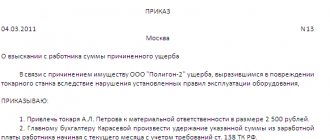Commentary to Art. 2.10 Code of Administrative Offenses of the Russian Federation
1. In accordance with Art. 2.1 of the Code of Administrative Offenses and this article, not only individuals are subject to administrative liability for committing administrative offenses, as was provided for by the Code of Administrative Offences, 1984, but also legal entities. Within the meaning of paragraph 1 of Art. 48 of the Civil Code, a legal entity is recognized as a commercial or non-profit organization that has separate property in ownership, economic control or operational management and is liable for its obligations with this property, can acquire and exercise property and personal non-property rights in its own name, bear obligations, be a plaintiff and a defendant in a court. The types of organizational and legal forms of legal entities - commercial and non-profit organizations - are defined accordingly in clauses 2 and 3 of Art. 50 GK.
2. On the criteria for the guilt of a legal entity in committing an administrative offense, see paragraph 3 of the commentary to Art. 2.1.
3. Merger, accession and transformation of a legal entity are particular types of its reorganization; according to paragraph 3 of Art. 57 of the Civil Code, reorganization of a legal entity in these cases can be carried out only with the consent of authorized state bodies. A legal entity is considered reorganized, with the exception of reorganization in the form of affiliation, from the moment of state registration of newly emerged legal entities, carried out in accordance with Federal Law of August 8, 2001 N 129-FZ “On State Registration of Legal Entities and Individual Entrepreneurs” (as amended Federal Law of December 23, 2003 N 185-FZ).
For details of the reorganization of a legal entity in the form of affiliation, see paragraph 4 of Art. 57 Civil Code.
4. Within the meaning of parts 7 and 8 of the commented article, it is intended to establish the legal fact of completion of the reorganization. According to Art. 16 of the Federal Law “On State Registration of Legal Entities and Individual Entrepreneurs”, from the moment of state registration of a newly emerged legal entity, the reorganization of a legal entity in the form of transformation is considered completed, and the transformed legal entity is considered to have ceased its activities.
Reorganization of legal entities in the form of a merger is considered completed from the moment of state registration of the newly emerged legal entity, and legal entities reorganized in the form of a merger are considered to have ceased their activities.
Reorganization of a legal entity in the form of division is considered completed from the moment of state registration of the last of the newly emerged legal entities, and a legal entity reorganized in the form of division is considered to have ceased its activities.
Reorganization of a legal entity in the form of separation is considered completed from the moment of state registration of the last of the newly emerged legal entities.
Reorganization of a legal entity in the form of merger is considered completed from the moment an entry is made in the Unified State Register of Legal Entities about the termination of the activities of the last of the merged legal entities.
5. In accordance with Part 2 of Art. 3.2 of the Administrative Code only the following types of administrative penalties can be applied to a legal entity: warning; administrative penalty; paid seizure of the instrument or subject of an administrative offense; confiscation of the instrument or subject of an administrative offense. Within the meaning of Part 8 of the commented article, administrative penalties are meant that can be applied to a legal entity, with the exception of a warning.
6. In accordance with Part 1 of the commented article, legal entities are subject to administrative liability in cases provided for by the articles of the Special Part of the Code of Administrative Offenses or the laws of the constituent entities of the Federation.
7. The standards established by the articles of section. I, III, IV, V Code of Administrative Offences, apply equally to both individuals and legal entities, with the exception of cases where the norms established by these articles of the Code of Administrative Offenses apply only to an individual or only to a legal entity, and also in cases where within the meaning of these rules, they relate and can only be applied to an individual.
Thus, when qualifying an administrative offense of a legal entity, it is necessary to interpret the legal norm in accordance with the specified rules, except in cases where the norms established by the articles of Section. I, III, IV and V Code of Administrative Offences, does not contain a direct indication of their application only to individuals or only to legal entities; A similar indication is provided for in Part 2 of Art. 3.2 of the Code of Administrative Offences, according to which only administrative penalties defined in clauses 1 - 4, part 1 of this article can be applied to a legal entity.
8. On the administrative liability of foreign legal entities, see the commentary to Art. 2.6.
Comments ()
Write a comment
Liability framework for legal entities
A mandatory condition under which it is possible to hold a legal entity accountable is the illegality of the actions, as well as the presence of guilt in their implementation. The liability of a legal entity, being a measure of state influence, is applied only in cases provided for by law, enshrined in the Code of Administrative Offenses of the Russian Federation.
If objective and subjective aspects are available and proven, it is possible to bring administrative liability. The guilt of legal entities can be established by proving that they have the ability to comply with the rules and regulations for the violation of which liability is imposed, but the person did not take measures depending on him to comply with them.
The process of attraction is the same and does not depend on the type and composition of the offense. The essence of legal responsibility and punishment is the application of coercive measures by the state, which is the inevitable result of the unlawful actions of a leader.
If an administrative violation was committed by an employee of the organization, only he is responsible for it, thus, responsibility is individually determined and does not transfer to other entities.
Specialist assistance to legal entities and organizations
Sign up for a consultation with the practice manager!
+7






